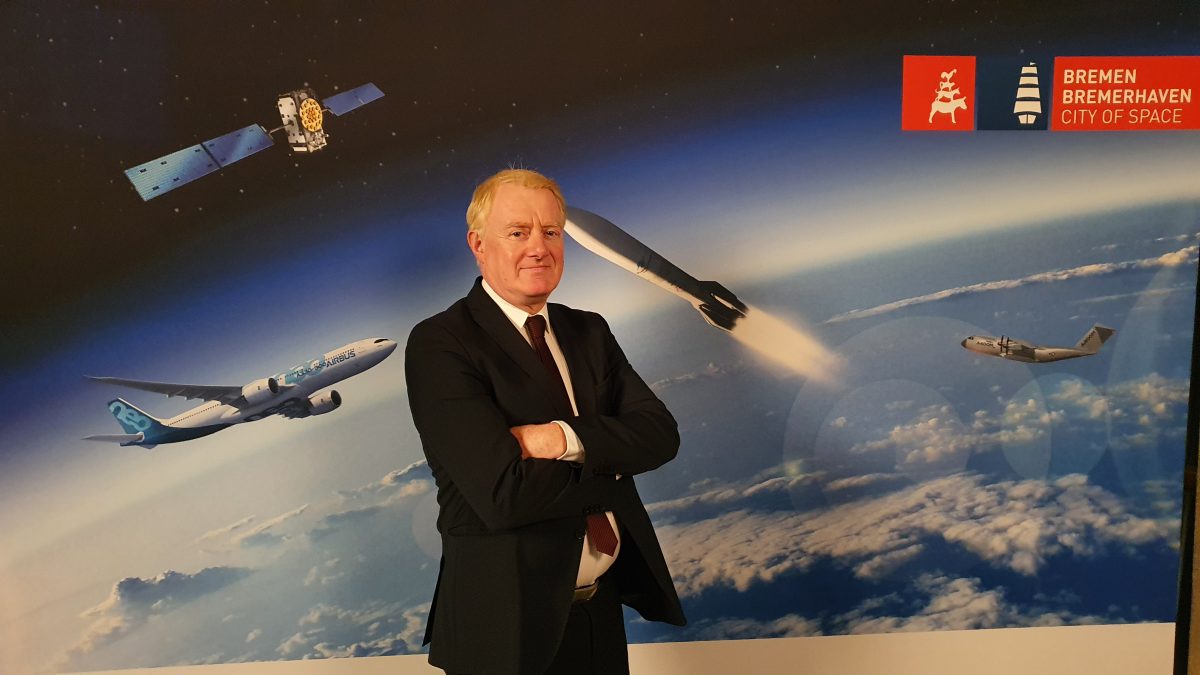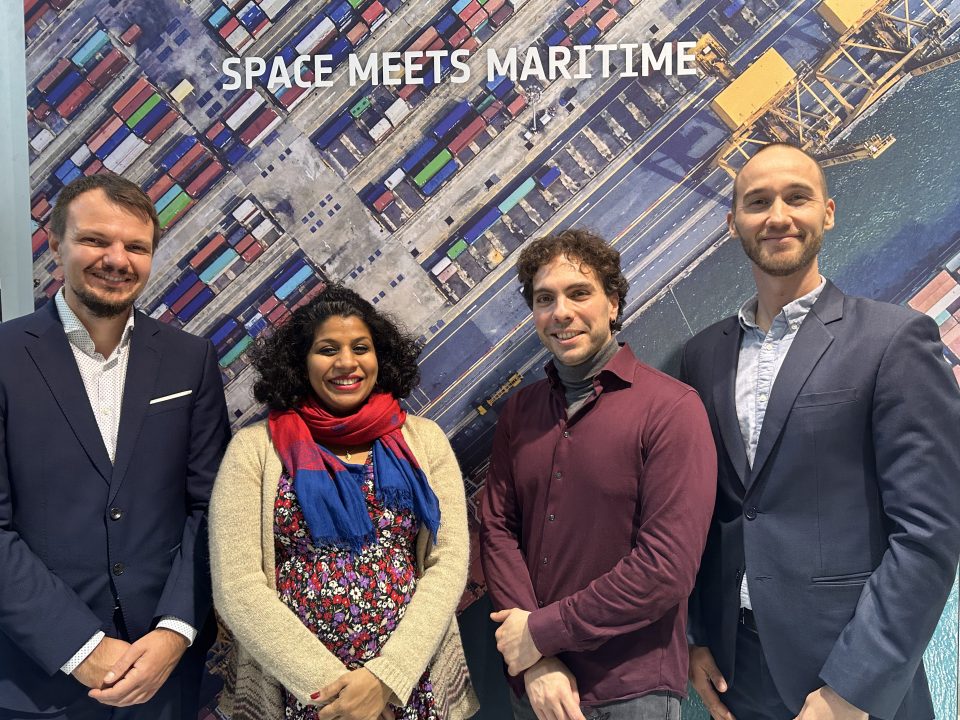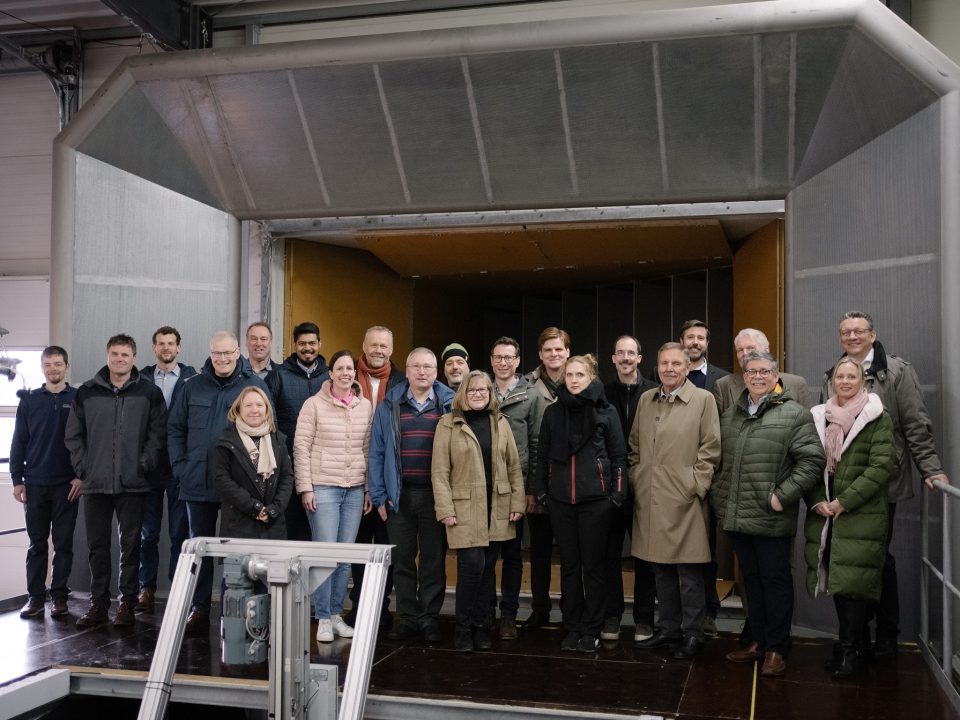
Lift Off for Space Tech Expo Europe 2022 in Bremen
21.11.2022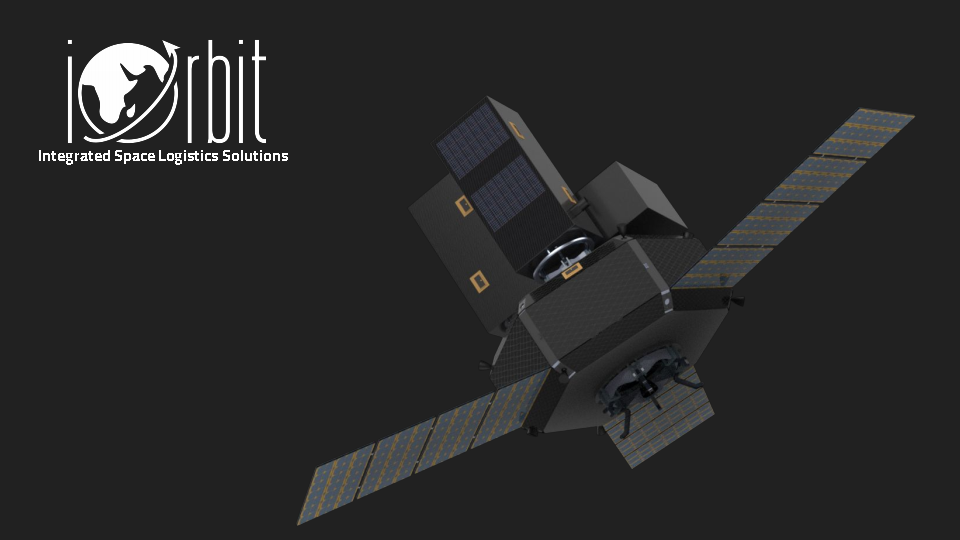
iorbit GmbH plans all-round carefree offer for launch services and satellite manufacturers
09.12.2022On 22 and 23 November 2022 in Paris, the course for Europe’s space ambitions in the upcoming years was determined. AviaSpace spoke to Siegfried Monser, space coordinator for the state of Bremen, about the latest results of the ESA Council Meeting at Ministerial level and their significance for the state of Bremen.
Mr. Monser, how should the results of the conference be classified overall?
Siegfried Monser: “The ESA Council Meeting at Ministerial level 2022 was dominated by global crisis management. The war in Ukraine, with its drastic effects on [the] space [community], as well as the energy and climate crises, were the main topics. However, this was also linked to the realisation that space can also contribute a great deal to overcome these crises. In the end, many players in the German space sector, as well as the industry associations, were positively surprised by the level of German participation in the future ESA programmes. This had not been expected. Bremen – together with Bavaria and Baden-Wurttemberg – and the German Aerospace Industries Association (BDLI), had been campaigning for an increase in the German ESA contribution for some time.”
It can be noted that Germany continues to be the largest contributor to ESA, with a contribution of 3.5 billion euros (4 billion, adjusted for inflation). Of the total budget of 16.9 billion euros, Germany contributes 20.8 percent, making it ESA’s strongest partner, along with France (18.9 percent) and Italy (18.2 percent). However, compared to 2019, France and Italy have increased their contribution significantly more than Germany.
Europe has therefore clearly emphasized its space ambitions, even if ESA originally wanted to collect more than 18 billion euros. With these decisions, Europe is also demonstrating its wish for sovereignty, especially in the areas of Earth observation and climate protection, science, telecommunications and lunar robotics. However, international partnerships were not disregarded, such as in NASA’s Artemis programme.

Portrait of the ministers (© ESA 2022)
Which programmes has Germany subscribed to?
“Like all ESA member states, Germany participates in the mandatory ESA programmes, according to its economic strength, with 1.15 billion euros in this round. This includes the ESA administration, the launch site in Kourou and the important science programmes.
According to figures published by DLR, about 2.37 billion euros of Germany’s contribution is for the optional programmes: including 669 million for Earth observation, 365 million for telecommunications projects, 50 million for technology programmes, 155 million for space situational awareness and space security, 368 million for space transportation and operations, and approximately 726 million for astronautical space flight, microgravity research and exploration.”
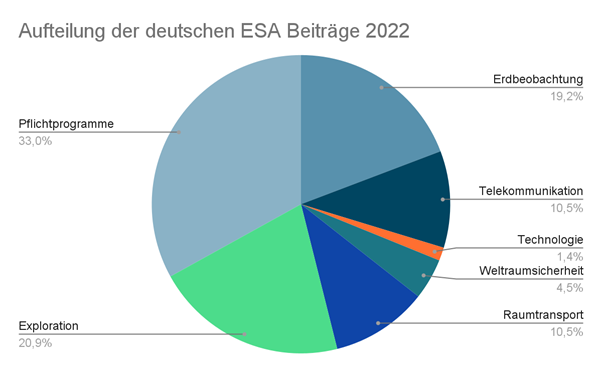
Source: DLR, https://www.dlr.de/content/de/artikel/news/2022/04/20221123_esa-ministerratskonferenz-in-paris.html
What significance do the results have for Bremen?
“As the smallest federal state, Bremen is the state with the highest density of aeronautics and space activities in Germany. Basically, every ESA Council meeting at Ministerial level has a greater or lesser impact.”
The areas in detail:
Space Exploration/Astronautical Space Flight
The high German subscription allows continuity in the German leadership role in astronautical space flight and exploration – this if very important for Bremen. The European Service Module for NASA’s Artemis lunar missions is built here at Airbus. With the landing of the Orion spacecraft in the Pacific Ocean on 11 December, the first mission was successfully completed. The second ESM for Artemis II, which will land astronauts on the moon, has already been delivered by Airbus to the Kennedy Space Center. It has also been decided to develop a European robotic lunar lander called, ‘Argonaut’, with a significant German contribution. Here, too, Bremen companies are confident of the great opportunities thanks to their expertise. The ISS, with the Bremen Columbus laboratory, will continue to operate until 2030, and the ExoMars mission, which could no longer take place due to the war in the Ukraine, is now being tackled by ESA with new partners. OHB from Bremen has already contributed parts to the landing carrier and the analysis equipment. There are new possibilities here now.
Earth Observation and Climate Protection
“Earth observation and climate protection are eminently important for the global understanding of our Earth and precise climate monitoring, and therefore one of the most important tasks relating to space for the German federal government. Here, too, Germany has retained its leading role in Europe. Of the 669 million euros, 185 million euros are allocated to Copernicus. In Bremen, OHB state of the art Earth observation satellites such as CO2M, EnMap, as well as weather satellites, are built. Companies such as DSI and ZARM Technik are also important suppliers for many satellite programmes worldwide.”
New Space
The field of commercialisation has experienced an enormous boost, which the member states intend to support with 100 million euros. To this end, the Ministerial Council has launched several initiatives and further strengthened well-established ones such as the ESA Business Incubation Centres. This is having a positive effect on the ESA Business Incubation Centre Northern Germany. The incubator is based at the BITZ and the Digital Hub Industrie (DHI). At the beginning of November 2022, the Senate of the State of Bremen agreed to extend the programme for another five years (until the end of 2027). The Senator for Economics, Labour and Europe thus created the financial and organisational framework conditions for the continuation and further development of the content of the Space Incubator.
Space Transportation
Independent access to space is certainly one of the core elements for Europe’s sovereignty. Without space transportation, there would be no applications from space. With the decision of the conference, the entry into the market and the operation of Ariane 6, are secured. By participating in the technology and qualification programme for future launchers (Future Launchers Preparatory Programme), necessary developments such as the development of a cost-effective lightweight upper stage made of carbon fibre composite material are also secured. As is well known, the Ariane upper stage is developed and built by ArianeGroup in Bremen. Overall, we would have liked to have had an even clearer signal in the area of space transportation, including reusability. It remains to be seen whether Ariane 6 can remain competitive in the medium term. In addition, ESA now allows small, private microlaunchers companies to launch ESA payloads, thus creating more competition.
Telecommunications/Technology
Germany has also decided to participate in the technological preparation of the future European satellite programme, ‘IRIS2’, also known as ‘Secure Connectivity’. Germany has subscribed to approximately half of France’s share here, but this still amounts to 189 million euros. In Bremen, for example, OHB has a lot of expertise, and the company will certainly take on the competition in this EU programme. It is also interesting for Bremen that Germany is participating in the development of strategic key technologies, such as laser communication or quantum encryption in satellite-based information transmission. These technologies are important in being able to act more safely and autonomously in Europe in the future.
Space Security
Germany has also been involved in this area and, for example, the important HERA satellite mission to the asteroid ‘Didymos’, which began at OHB in Bremen, will be continued and is scheduled to be launched in 2024 (as a follow-up to NASA’s ‘DART’ mission).
Conclusion:
Germany has sent a strong signal that it is ready to take a leading role in Europe’s space endeavours and its necessary technological development. The space community in Bremen benefits from the overall results of the ESA Council Meeting at Ministerial level, and this applies not only to the major “primes”, but also to supplier companies and research institutes.
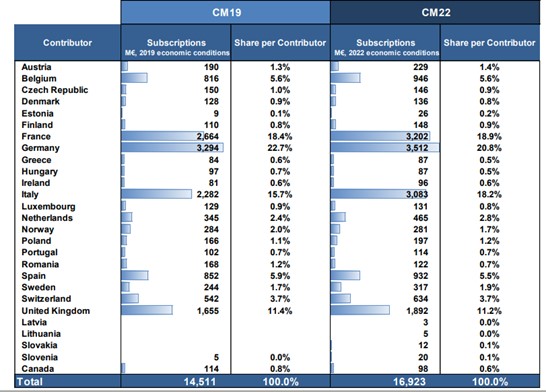
Source: ESA, country subscriptions at the 2022 ESA Council Meeting at Ministerial level
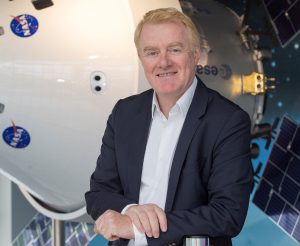
Siegfried Monser, space coordinator for the state of Bremen. (© Airbus DS).
About Siegfried Monser
Siegfried Monser has been space coordinator for the state of Bremen since 2021. The coordinator’s task is to ensure and continue the cooperation between the federal states of Baden-Württemberg, Bavaria, and Bremen, with the German federal government as well as the EU. In addition to this, he maintains direct contact with Bremen’s companies and institutions and is an ambassador for the state of Bremen’s space activities.
Since 2017, Monser has worked as Communications Business Partner for Airbus Space Systems and played a key role in shaping the communications surrounding the Artemis ‘Orion’ mission. Prior to that, he was Head of Internal Communications at Airbus Defence and Space (formerly Astrium) for 13 years.
About the aeronautics and space coordinators of the state of Bremen
One coordinator for aviation and one coordinator for space travel were commissioned by the Minister for Economic Affairs, Labour and Europe to strengthen and further develop the aeronautics and space location of the state of Bremen. Professor Rolf Henke (Aviation) and Siegfried Monser (space) were entrusted with the tasks. It is important to maintain direct contact with Bremen’s companies, institutions and politicians and to support the interests of the state of Bremen with regard to the further development of the aeronautics and space industry. This task also requires close coordination with the German federal states, the federal government, and the EU. The coordinators act as ambassadors for Bremen.





